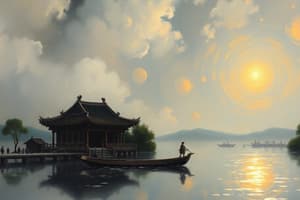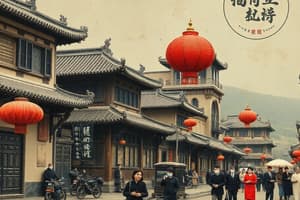Podcast
Questions and Answers
在人类历史上建立了迄今为止最大帝国的领袖是谁?
在人类历史上建立了迄今为止最大帝国的领袖是谁?
- 成吉思汗 (correct)
- 郑和
- 孙武
- 朱元璋
哪位领袖的远航为中国传播知识并开拓贸易机会起到了关键作用?
哪位领袖的远航为中国传播知识并开拓贸易机会起到了关键作用?
- 郑和 (correct)
- 曹操
- 孔子
- 李白
中国农历新年也称为什么节日?
中国农历新年也称为什么节日?
- 端午节
- 清明节
- 春节 (correct)
- 中秋节
中国的传统食物文化受到什么因素的影响?
中国的传统食物文化受到什么因素的影响?
在中国文化中,家庭关系往往何时优先于个体权利?
在中国文化中,家庭关系往往何时优先于个体权利?
哪位领袖在1978年以后鼓励经济改革,导致中国经济稳步增长?
哪位领袖在1978年以后鼓励经济改革,导致中国经济稳步增长?
在中国历史上,第一个皇帝是谁?
在中国历史上,第一个皇帝是谁?
汉朝时期的重要发展是什么?
汉朝时期的重要发展是什么?
唐朝(618-907年)以其哪些成就而闻名?
唐朝(618-907年)以其哪些成就而闻名?
在中国历史上,下列哪个皇帝统治时期见证了丝绸之路与欧洲的贸易联系?
在中国历史上,下列哪个皇帝统治时期见证了丝绸之路与欧洲的贸易联系?
汉朝时期所开发的贸易路线是什么?
汉朝时期所开发的贸易路线是什么?
古代中国皇帝石昊统一了哪七个交战国家?
古代中国皇帝石昊统一了哪七个交战国家?
Flashcards are hidden until you start studying
Study Notes
China - A Brief Overview of Its History and Culture
China is one of the oldest civilizations known to mankind, with its roots stretching back thousands of years. It has a diverse and complex history that spans over four millennia, including periods of growth, decline, and rebirth. This section will highlight some key aspects of Chinese civilization through time, from ancient dynasties to modern times.
Ancient Origins
To understand contemporary China, it's essential to know something about its past. For instance, did you know that the first emperor of China was Shi Huangdi? He lived around 5th Century BC and united all seven warring states under his rule by claiming he was a descendant of Emperor Yandi. Not only this, during his reign, China's borders were expanded greatly into what we now know as Mongolia and Tibet. However, after his death, these conquests didn't last long; they eventually became independent again.
Later came the Han Dynasty which lasted for almost five centuries between 206 BC – AD 220. During their reign, Chinese agriculture advanced significantly as they developed irrigation systems like canals, dams, and dikes. Their era also saw progress in trade routes across Asia thanks largely due to the Silk Road connecting China with Europe.
Imperial Period
The imperial period began with the Tang Dynasty (AD 618–907) where significant achievements occurred such as inventions like gunpowder, paper currency, printing presses among others. However, later down the line comes another major event-the Mongol Invasion led by Kublai Khan who established the largest empire ever seen in human history! Under him, great developments flourished including improved transportation networks via waterways and roads.
Another important period is that of Ming Era when Zheng He traveled beyond East Asian waters even before Christopher Columbus set sail. These voyages played a crucial role in spreading knowledge globally while also opening up trading opportunities for China.
Modern Times
Of course, let us not forget recent events too. In more recent times, China faced numerous challenges such as colonialism followed by communist revolution. After World War II, many eastern countries remained under Soviet influence until the Cold War ended. Today's China continues to evolve rapidly thanks mainly to economic reforms encouraged since 1978 resulting in steady growth despite political protests occasionally occurring within its borders.
In terms of cultural heritage, there are several unique practices worth mentioning:
- Celebrations: Holidays celebrated throughout the year vary according to traditional customs and beliefs. Some notable ones include Spring Festival (Chinese New Year), Qixi Festival (The Double Seventh Day), Dragon Boat festival etc., each having distinct rituals associated with them.
- Food: Food habits differ regionally because different regions have separate climates thereby affecting types of produce grown locally thus dictating cuisine styles.
- Relationships: Family relationships take precedence over individual rights especially when it comes to arranged marriages where both families would negotiate terms prior to child marriage ceremonies taking place.
As China moves forward into future decades ahead with technological advancements happening constantly along with increasing global presence among other things -it’s safe to say that our understanding will continue deepening further enriching our knowledge base regarding its fascinating history and traditions!
Studying That Suits You
Use AI to generate personalized quizzes and flashcards to suit your learning preferences.



